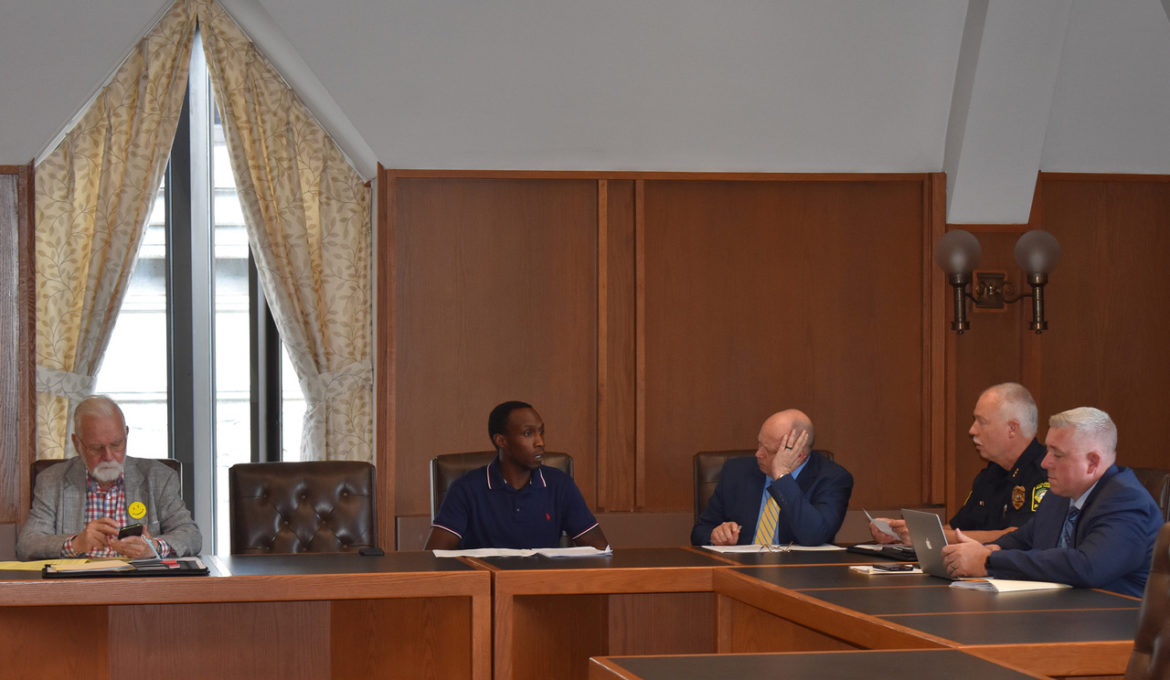By Thomas P. Caldwell, InDepthNH.org
CONCORD — With a key member of the committee unable to attend Thursday’s meeting, the group formulating recommendations to deal with police misconduct decided to hold off on substantive discussion of some draft proposals, but by the end of the half-hour session, Chair Matthew Broadhead declared that they had “slipped into a productive meeting.”
Attorney Julian Jefferson, who serves in the public defender’s office, has been advocating for a new state agency that is not affiliated with the Police Standards and Training Council, but the draft recommendation that the committee was to consider on Thursday called for a Law Enforcement Conduct Review Committee that would be attached to the PSTC.
Committee member Joseph Lascaze, representing the American Civil Liberties Union, asked to adjourn until Jefferson could be present. He did not receive a second to his motion, but the committee later agreed that it would improper to get into an in-depth discussion without Jefferson being there.
Sen. Sharon Carson, R-Londonderry, also did not attend on Thursday.
Instead, Broadhead, who is a senior assistant attorney general, ran down the changes proposed for the definition of misconduct. The existing definition comes from Police Standards and Training.
Broadhead said a new section under “moral character” includes conduct negatively reflecting on the officer’s trustworthiness or credibility. Examples include lying, falsification of records or evidence, tampering with records or witnesses, discriminatory actions, and “conduct, whether on or off duty, that would adversely reflect on a person’s fitness to perform law enforcement or corrections duties.”
Much of that language, he said, came from a memo by former Attorney General Gordon MacDonald, while the section on discrimination came from a draft legislative bill. A section on “egregious dereliction of duty” is based on a 2017 memo describing the exculpatory evidence schedule, commonly known as the Laurie List.
The 16-page draft proposal for a Law Enforcement Conduct Review Committee amends the Police Standards and Training Council law under Title VII to create the new governor-appointed committee which would be “administratively attached to New Hampshire Police Standards and Training.”
It would “review grievances alleging misconduct … and, if determined necessary, shall cause or direct an investigation of the alleged misconduct to be conducted, review the findings of the investigation, and, if deemed necessary, recommend that a public hearing be held by the Council on the matter and provide a recommendation of sanction upon a sustained finding by the Council.”
A section on “Accessibility and Confidentiality” would “protect the reputation of law enforcement officers from public disclosure of unwarranted complaints against them and … fulfill the public’s right to know of any action taken against a law enforcement officer when that action is based on a sustained finding of misconduct.”
It continues, “As a result all information and documents generated from this chapter shall be exempt from 91-A [the Right-To-Know law], except … The Council shall prepare and maintain a register of all complaints, which shall be open to public inspection and copying.”
For complaints that result in a sustained finding of misconduct, the public record also would include the name and address of the officer; formal charges; the findings, conclusions, and order of the Council; the transcript of the hearing and exhibits admitted to the hearing; any stipulation filed with the Council; and any final disposition by the New Hampshire Supreme Court.
Committee members received the draft only a day ahead of Thursday’s meeting, so many had not had a chance to go through the document in detail. However, Lt. Mark Morrison of the N.H. Police Association, said they should make sure they are using objective criteria, objecting to the use of the phrase “including but not limited to” in the list of what constitutes misconduct, as it leaves the door open to subjective interpretation.
Morrison also wanted to be sure they are not labeling minor policy violations as misconduct.
John Scippa, director of Police Standards and Training, agreed. “We really do want to make sure that we’re saying specifically this is misconduct, it’s not a low-level policy violation, it may or may not be violation of our rules [at Police Standards]. We’re really trying to shine a spotlight on those police officers that need to be identified for committing misconduct. It’s important to know what that definition is.”
Scippa envisions the change as requiring a full-time attorney on staff, rather than the part-time attorney his council currently has. He said they also would likely need two investigators who are not part of the training staff, along with an administrative staffer with some investigative function.
“We may need more, or a lot less,” he said.
Because they had to cut Thursday’s meeting short and could not fully discuss the draft proposals, they have scheduled two meetings for next week, on Wednesday, Oct. 13, as well as their regular Thursday meeting on Oct. 14. They also will meet on Monday, Oct. 18. The commission is charged with making recommendations to the governor and Legislature by the end of the month.
T.P. Caldwell is a writer, editor, photographer, and videographer who formed and serves as project manager of the Liberty Independent Media Project. Contact him at liberty18@me.com.





